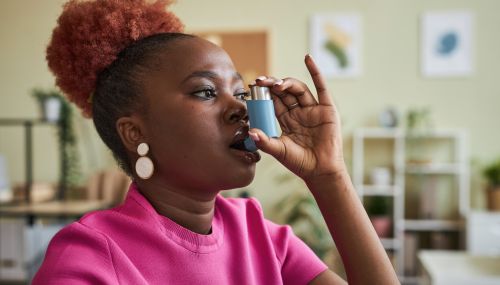LGBTQ+ adults at greater risk of asthma
News
3 September 2025

Sexual minority adults in the UK are more likely to be diagnosed with asthma than their heterosexual peers, according to a new UCL study.
Published in the Public Health journal, the research finds that sexual minority women and bisexual adults are at the greatest risk of asthma, with disparities between them and their heterosexual counterparts worsening across life.
What the researchers looked at
Academics from the UCL Centre for Longitudinal Studies examined information from 84,480 adults aged between 18 and 90+ years who are taking part in five large nationally representative-longitudinal studies: the Millennium Cohort Study (MCS), Next Steps, the 1970 British Cohort Study (BCS70), Understanding Society: the UK Household Longitudinal Study (UKHLS), and the English Longitudinal Study of Ageing (ELSA).
Study participants reported their asthma diagnosis at ages 18-21 in MCS, at ages 30-32 in Next Steps and at age 46 in BCS70. Data was collected in wave 9 of ELSA and wave 11 of UKHLS, with respondents ranging from age 18 to 90+.
The researchers pooled the datasets to increase the sample size and statistical power of their data on sexual identity and health inequalities. Studies were included in the analysis if they measured sexual identity and collected information on asthma. In addition, the researchers looked at data on the year of birth, sex, ethnicity, educational attainment as well as employment status.
What the study found
The research findings revealed that sexual minority adults were 43% more likely to be diagnosed with asthma than their heterosexual peers. Bisexual adults and LGBTQ+ women were at particular risk of having asthma, being 75% and 51% more likely than their heterosexual counterparts respectively. Sexual minority men were 29% more likely.
A measure of lung function (spirometry) was recorded by nurses in the field for UKHLS and ELSA study members. When examined, the findings revealed that sexual minority adults were at 50% greater risk of poor lung function than their heterosexual counterparts.
Deepening disparities over time
To explore the impact of ageing on asthma symptoms, the researchers compared longitudinal data collected a decade apart. This data was collected from respondents in wave 1 (2009-11) and wave 11 (2019-21) for UKHLS, at age 34 (2004) and age 46 (2016) for BCS70 and in wave 4 (2008-9) and wave 9 (2018-19) for ELSA. They found that differences in asthma diagnosis between sexual minority adults and their heterosexual peers widened as respondents aged. For LGBTQ+ women, the risk increased by approximately 25%. However, for LGBTQ+ men, the likelihood of asthma decreased by 19%.
By looking at MCS data between age 7 (2008) and ages 18-21 (2020-21), the researchers found that there was no difference in asthma risk by sexuality within this younger group and found no change over time in this sample. They said that this finding suggests that inequalities in asthma risk by sexuality emerge after childhood , expand in adulthood and widen as individuals age.
Smoking risk
In a separate analysis, the researchers aimed to understand why LGBTQ+ adults were at greater risk of asthma. Although the research showed that sexual minority adults were more likely to smoke than heterosexual adults, smoking only played a limited role as a potential driver.
The researchers noted that future research should investigate the role of other potential factors, such as physical activity and obesity, air pollution and poor housing in urban areas, chronic stress and unequal access to healthcare.
LGBTQ+ health inequalities
Lead author, Dr. Evangeline Tabor (UCL Centre for Longitudinal Studies) said: “We have seen similar studies in an international context, but this is the first study that looked specifically at the relationship between asthma and the LGBTQ+ population across the UK as a whole. Respiratory diseases can impact quality of life and can be life-threatening so it’s important to be aware the LGBTQ+ population face health inequalities not only in the context of sexual or mental health.
“It is significant that the research was done on a longitudinal sample because it helps establish that the disparities first emerge during late adolescence so there is a window where we can potentially intervene before these disparities start to crystalise. More awareness in the policy and medical community about these patterns in LGBTQ+ populations can allow us to address these inequalities.”
Further information
‘Sexuality and respiratory outcomes in the UK: disparities, development and mediators in multiple longitudinal studies,’ by Evangeline Tabor, Dylan Kneale and Praveetha Patalay is available on the Public Health journal website.
Back to news listing





